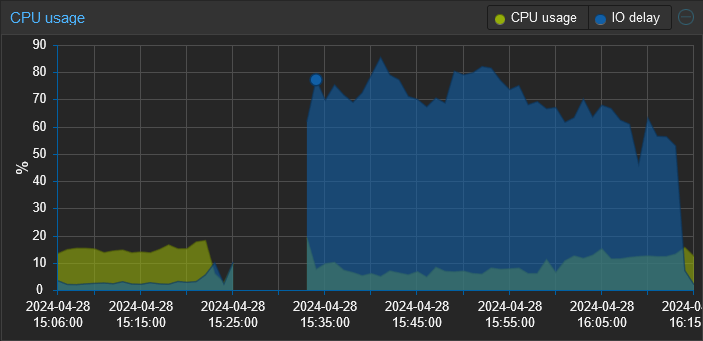I've started encountering a problem that I should use some assistance troubleshooting. I've got a Proxmox system that hosts, primarily, my Opnsense router. I've had this specific setup for about a year.
Recently, I've been experiencing sluggishness and noticed that the IO wait is through the roof. Rebooting the Opnsense VM, which normally only takes a few minutes is now taking upwards of 15-20. The entire time my IO wait sits between 50-80%.
The system has 1 disk in it that is formatted ZFS. I've checked dmesg, and the syslog for indications of disk errors (this feels like a failing disk) and found none. I also checked the smart statistics and they all "PASSED".
Any pointers would be appreciated.

Edit: I believe I've found the root cause of the change in performance and it was a bit of shooting myself in the foot. I've been experimenting with different tools for log collection and the most recent one is a SIEM tool called Wazuh. I didn't realize that upon reboot it runs an integrity check that generates a ton of disk I/O. So when I rebooted this proxmox server, that integrity check was running on proxmox, my pihole, and (I think) opnsense concurrently. All against a single consumer grade HDD.
Thanks to everyone who responded. I really appreciate all the performance tuning guidance. I've also made the following changes:
- Added a 2nd drive (I have several of these lying around, don't ask) converting the zfs pool into a mirror. This gives me both redundancy and should improve read performance.
- Configured a 2nd storage target on the same zpool with compression enabled and a 64k block size in proxmox. I then migrated the 2 VMs to that storage.
- Since I'm collecting logs in Wazuh I set Opnsense to use ram disks for /tmp and /var/log.
Rebooted Opensense and it was back up in 1:42 min.
(If it's not failing, which would be the first thing I'd check)
Do you have any new VMs up and running. IO was the bane of my existence with proxmox, but realized it's just that VMs eat a ton of IO, especially with ZFS. A standard HDD won't cut it (unless you have one and only one VM using that disk). Even sata SSDs just didn't cut it over time, I had to build a full raid that would support 5-10 VMs on it before I saw IO wait drop enough.
I'm trying to think of anything I may have changed since the last time I rebooted the opnsense VM. But I try to keep up on updates and end up rebooting pretty regularly. The only things on this system are the opnsense VM and a small pihole VM. At the time of the screenshot above, the opnsense VM was the only thing running.
If it's not a failing HDD, my next step is to try and dig into what's generating the I/O to see if there's something misbehaving.
I had bad luck with ZFS on proxmox because of all of the overhead, I found with my tiny cluster it was better to do good old ext4 and then just do regular backups. ZFS actually killed quite a few of my drives because of it's heavyweight. Not saying that's your problem, but I wouldn't be surprised if it was